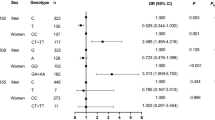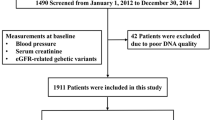Abstract
Uncoupling proteins (UCPs) belong to the family of mitochondrial transporter proteins and mediate regulated proton leak across the inner mitochondrial membrane. The UCPs play an important role in energy homeostasis and reactive oxygen species (ROS) release, and have been established as candidate genes for obesity, diabetes and hypertension. This study examined the possible association between the single nucleotide polymorphisms (SNPs) of UCP1–3 genes and essential hypertension (EH) in a northeastern Han Chinese population. A total of 2207 Chinese Han subjects were enrolled, including 1045 normotensives and 1162 hypertensives. Genotyping of UCP1 rs1800592, UCP1 rs12502572, UCP2 rs659366, UCP2 rs660339, and UCP3 rs3781907 was detected using Sequenom MassArray System. SHEsis was used to analyze linkage disequilibrium and haplotype. No evident association was observed between the genotype distributions and allele frequencies of individual SNPs and EH. Haplotype analysis showed the haplotype GAATA (rs1800592-rs12502572-rs659366-rs660339-rs3781907) was significantly associated with lower EH risk (p = 0.001, χ2 = 10.861, OR = 0.634, 95% CI = 0.483–0.833), and AGATG was associated with increased EH risk (p = 0.012, χ2 = 6.287, OR = 1.265, 95% CI = 1.052–1.521). These findings suggest haplotypes of UCP1–3 genes are linked to EH risk in a northeastern Han Chinese population. Further investigation with larger sample size in multiethnic population is needed to confirm our results.
This is a preview of subscription content, access via your institution
Access options
Subscribe to this journal
Receive 12 digital issues and online access to articles
$119.00 per year
only $9.92 per issue
Buy this article
- Purchase on Springer Link
- Instant access to full article PDF
Prices may be subject to local taxes which are calculated during checkout

Similar content being viewed by others
References
Coy V. Genetics of essential hypertension. J Am Acad Nurse Pract. 2005;17:219–24.
Brito R, Castillo G, Gonzalez J, Valls N, Rodrigo R. Oxidative stress in hypertension: mechanisms and therapeutic opportunities. Exp Clin Endocrinol Diabetes. 2015;123:325–35.
Dalgaard LT, Pedersen O. Uncoupling proteins: functional characteristics and role in the pathogenesis of obesity and Type II diabetes. Diabetologia. 2001;44:946–65.
Pierelli G, Stanzione R, Forte M, Migliarino S, Perelli M, Volpe M, et al. Uncoupling protein 2: a key player and a potential therapeutic target in vascular diseases. Oxid Med Cell Longev. 2017;2017:7348372.
Ricquier D, Bouillaud F. The uncoupling protein homologues: UCP1, UCP2, UCP3, StUCP and AtUCP. Biochem J. 2000;345:161–79.
Klaus S, Casteilla L, Bouillaud F, Ricquier D. The uncoupling protein UCP: a membraneous mitochondrial ion carrier exclusively expressed in brown adipose tissue. Int J Biochem. 1991;23:791–801.
Richard D, Rivest R, Huang Q, Bouillaud F, Sanchis D, Champigny O, et al. Distribution of the uncoupling protein 2 mRNA in the mouse brain. J Comp Neurol. 1998;397:549–60.
Ricquier D. Respiration uncoupling and metabolism in the control of energy expenditure. Proc Nutr Soc. 2005;64:47–52.
Vidal-Puig A, Solanes G, Grujic D, Flier JS, Lowell BB. UCP3: an uncoupling protein homologue expressed preferentially and abundantly in skeletal muscle and brown adipose tissue. Biochem Biophys Res Commun. 1997;235:79–82.
Pi J, Bai Y, Daniel KW, Liu D, Lyght O, Edelstein D, et al. Persistent oxidative stress due to absence of uncoupling protein 2 associated with impaired pancreatic beta-cell function. Endocrinology. 2009;150:3040–8.
Ma S, Ma L, Yang D, Luo Z, Hao X, Liu D, et al. Uncoupling protein 2 ablation exacerbates high-salt intake-induced vascular dysfunction. Am J Hypertens. 2010;23:822–8.
Ma S, Zhang Y, Wang Q, Yang D, Li D, Tang B, et al. Ablation of uncoupling protein 2 exacerbates salt-induced cardiovascular and renal remodeling associated with enhanced oxidative stress. Int J Cardiol. 2014;175:206–10.
Ma S, Wang Q, Zhang Y, Yang D, Li D, Tang B, et al. Transgenic overexpression of uncoupling protein 2 attenuates salt-induced vascular dysfunction by inhibition of oxidative stress. Am J Hypertens. 2014;27:345–54.
Chan SH, Wu CA, Wu KL, Ho YH, Chang AY, Chan JY. Transcriptional upregulation of mitochondrial uncoupling protein 2 protects against oxidative stress-associated neurogenic hypertension. Circ Res. 2009;105:886–96.
Sun F, He N, Zhang K, Wu N, Zhao J, Qiu C. Association of ACE gene A2350G and I/D polymorphisms with essential hypertension in the northernmost province of China. Clin Exp Hypertens. 2018;40:32–38.
Crispim D, Fagundes NJ, dos Santos KG, Rheinheimer J, Boucas AP, de Souza BM, et al. Polymorphisms of the UCP2 gene are associated with proliferative diabetic retinopathy in patients with diabetes mellitus. Clin Endocrinol (Oxf). 2010;72:612–9.
Esterbauer H, Oberkofler H, Liu YM, Breban D, Hell E, Krempler F, et al. Uncoupling protein-1 mRNA expression in obese human subjects: the role of sequence variations at the uncoupling protein-1 gene locus. J Lipid Res. 1998;39:834–44.
Brondani LA, de Souza BM, Duarte GC, Kliemann LM, Esteves JF, Marcon AS, et al. The UCP1 -3826A/G polymorphism is associated with diabetic retinopathy and increased UCP1 and MnSOD2 gene expression in human retina. Invest Ophthalmol Vis Sci. 2012;53:7449–57.
Li X, Liu J, Wang G, Yu J, Sheng Y, Wang C, et al. Determination of UCP1 expression in subcutaneous and perirenal adipose tissues of patients with hypertension. Endocrine. 2015;50:413–23.
Kotani K, Sakane N, Saiga K, Tsuzaki K, Shimohiro H, Tabata M, et al. The uncoupling protein-1 gene -3826A/G polymorphism and hypertension in Japanese subjects. Clin Chem Lab Med. 2007;45:1186–9.
Dhall M, Chaturvedi MM, Rai U, Kapoor S. Sex-dependent effects of the UCP1 -3826 A/G polymorphism on obesity and blood pressure. Ethn Dis. 2012;22:181–4.
Jia JJ, Zhang X, Ge CR, Jois M. The polymorphisms of UCP2 and UCP3 genes associated with fat metabolism, obesity and diabetes. Obes Rev. 2009;10:519–26.
Salopuro T, Pulkkinen L, Lindstrom J, Kolehmainen M, Tolppanen AM, Eriksson JG, et al. Variation in the UCP2 and UCP3 genes associates with abdominal obesity and serum lipids: the Finnish Diabetes Prevention Study. BMC Med Genet. 2009;10:94.
de Souza BM, Brondani LA, Boucas AP, Sortica DA, Kramer CK, Canani LH, et al. Associations between UCP1 -3826A/G, UCP2 -866G/A, Ala55Val and Ins/Del, and UCP3 -55C/T polymorphisms and susceptibility to type 2 diabetes mellitus: case-control study and meta-analysis. PLoS ONE. 2013;8:e54259.
Brondani LA, Assmann TS, de Souza BM, Boucas AP, Canani LH, Crispim D. Meta-analysis reveals the association of common variants in the uncoupling protein (UCP) 1-3 genes with body mass index variability. PLoS ONE. 2014;9:e96411.
Gul A, Ates O, Ozer S, Kasap T, Ensari E, Demir O, et al. Role of the polymorphisms of uncoupling protein genes in childhood obesity and their association with obesity-related disturbances. Genet Test Mol Biomark. 2017;21:531–8.
Su M, Chen X, Chen Y, Wang C, Li S, Ying X, et al. UCP2 and UCP3 variants and gene-environment interaction associated with prediabetes and T2DM in a rural population: a case control study in China. BMC Med Genet. 2018;19:43.
Ji Q, Ikegami H, Fujisawa T, Kawabata Y, Ono M, Nishino M, et al. A common polymorphism of uncoupling protein 2 gene is associated with hypertension. J Hypertens. 2004;22:97–102.
Tian XY, Wong WT, Xu A, Lu Y, Zhang Y, Wang L, et al. Uncoupling protein-2 protects endothelial function in diet-induced obese mice. Circ Res. 2012;110:1211–6.
Schrauwen P, Xia J, Walder K, Snitker S, Ravussin E. A novel polymorphism in the proximal UCP3 promoter region: effect on skeletal muscle UCP3 mRNA expression and obesity in male non-diabetic Pima Indians. Int J Obes Relat Metab Disord. 1999;23:1242–5.
Xu YP, Liang L, Wang CL, Fu JF, Liu PN, Lv LQ, et al. Association between UCP3 gene polymorphisms and nonalcoholic fatty liver disease in Chinese children. World J Gastroenterol. 2013;19:5897–903.
Dato S, De Rango F, Crocco P, Passarino G, Rose G. Pleiotropic effects of UCP2-UCP3 variability on leucocyte telomere length and glucose homeostasis. Biogerontology. 2017;18:347–55.
Hsu YH, Niu T, Song Y, Tinker L, Kuller LH, Liu S. Genetic variants in the UCP2-UCP3 gene cluster and risk of diabetes in the Women’s Health Initiative Observational Study. Diabetes. 2008;57:1101–7.
Ochoa MC, Santos JL, Azcona C, Moreno-Aliaga MJ, Martinez-Gonzalez MA, Martinez JA, et al. Association between obesity and insulin resistance with UCP2-UCP3 gene variants in Spanish children and adolescents. Mol Genet Metab. 2007;92:351–8.
Acknowledgements
This work was supported by the Education Department of Heilongjiang Province, China [grant number 12531817].
Author information
Authors and Affiliations
Corresponding authors
Ethics declarations
Conflict of interest
The authors declare that they have no conflict of interest.
Supplementary information
Rights and permissions
About this article
Cite this article
Sun, H., Zhang, JT., Xie, XR. et al. Association of uncoupling protein gene polymorphisms with essential hypertension in a northeastern Han Chinese population. J Hum Hypertens 33, 524–530 (2019). https://doi.org/10.1038/s41371-018-0141-3
Received:
Revised:
Accepted:
Published:
Issue Date:
DOI: https://doi.org/10.1038/s41371-018-0141-3
This article is cited by
-
Thermoreceptor TRPV1 regulates body weight and blood pressure in the absence of thermogenin
Hypertension Research (2022)
-
Association of uncoupling protein (Ucp) gene polymorphisms with cardiometabolic diseases
Molecular Medicine (2020)
-
Analysis of association between common variants of uncoupling proteins genes and diabetic retinopathy in a Chinese population
BMC Medical Genetics (2020)



